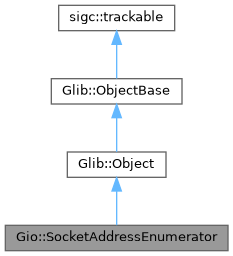|
| | SocketAddressEnumerator (SocketAddressEnumerator &&src) noexcept |
| |
| SocketAddressEnumerator & | operator= (SocketAddressEnumerator &&src) noexcept |
| |
| | ~SocketAddressEnumerator () noexcept override |
| |
| GSocketAddressEnumerator * | gobj () |
| | Provides access to the underlying C GObject.
|
| |
| const GSocketAddressEnumerator * | gobj () const |
| | Provides access to the underlying C GObject.
|
| |
| GSocketAddressEnumerator * | gobj_copy () |
| | Provides access to the underlying C instance. The caller is responsible for unrefing it. Use when directly setting fields in structs.
|
| |
| Glib::RefPtr< SocketAddress > | next (const Glib::RefPtr< Cancellable > &cancellable) |
| | Retrieves the next SocketAddress from enumerator.
|
| |
| Glib::RefPtr< SocketAddress > | next () |
| | A next() convenience overload.
|
| |
| void | next_async (const Glib::RefPtr< Cancellable > &cancellable, const SlotAsyncReady &slot) |
| | Asynchronously retrieves the next SocketAddress from the enumerator and then calls slot, which must call next_finish() to get the result.
|
| |
| void | next_async (const SlotAsyncReady &slot) |
| | Asynchronously retrieves the next SocketAddress from the enumerator and then calls slot, which must call next_finish() to get the result.
|
| |
| Glib::RefPtr< SocketAddress > | next_finish (const Glib::RefPtr< AsyncResult > &result) |
| | Retrieves the result of a completed call to g_socket_address_enumerator_next_async().
|
| |
| | Object (const Object &)=delete |
| |
| Object & | operator= (const Object &)=delete |
| |
| | Object (Object &&src) noexcept |
| |
| Object & | operator= (Object &&src) noexcept |
| |
| void * | get_data (const QueryQuark & key) |
| |
| void | set_data (const Quark & key, void *data) |
| |
| void | set_data_with_c_callback (const Quark & key, void *data, GDestroyNotify notify) |
| |
| void | set_data (const Quark & key, void *data, DestroyNotify notify) |
| | Prefer set_data_with_c_callback() with a callback with C linkage.
|
| |
| void | remove_data (const QueryQuark &quark) |
| |
| void * | steal_data (const QueryQuark &quark) |
| |
| | ObjectBase (const ObjectBase &)=delete |
| |
| ObjectBase & | operator= (const ObjectBase &)=delete |
| |
| void | set_property_value (const Glib::ustring & property_name, const Glib::ValueBase & value) |
| | You probably want to use a specific property_*() accessor method instead.
|
| |
| void | get_property_value (const Glib::ustring & property_name, Glib::ValueBase & value) const |
| | You probably want to use a specific property_*() accessor method instead.
|
| |
| template<class PropertyType > |
| void | set_property (const Glib::ustring & property_name, const PropertyType & value) |
| | You probably want to use a specific property_*() accessor method instead.
|
| |
| template<class PropertyType > |
| void | get_property (const Glib::ustring & property_name, PropertyType & value) const |
| | You probably want to use a specific property_*() accessor method instead.
|
| |
| template<class PropertyType > |
| PropertyType | get_property (const Glib::ustring & property_name) const |
| | You probably want to use a specific property_*() accessor method instead.
|
| |
| sigc::connection | connect_property_changed (const Glib::ustring & property_name, const sigc::slot< void()> &slot) |
| | You can use the signal_changed() signal of the property proxy instead.
|
| |
| sigc::connection | connect_property_changed (const Glib::ustring & property_name, sigc::slot< void()> &&slot) |
| | You can use the signal_changed() signal of the property proxy instead.
|
| |
| void | freeze_notify () |
| | Increases the freeze count on object.
|
| |
| void | thaw_notify () |
| | Reverts the effect of a previous call to freeze_notify().
|
| |
| virtual void | reference () const |
| | Increment the reference count for this object.
|
| |
| virtual void | unreference () const |
| | Decrement the reference count for this object.
|
| |
| GObject * | gobj () |
| | Provides access to the underlying C GObject.
|
| |
| const GObject * | gobj () const |
| | Provides access to the underlying C GObject.
|
| |
| GObject * | gobj_copy () const |
| | Give a ref-ed copy to someone. Use for direct struct access.
|
| |
Enumerator type for objects that contain or generate SocketAddresses.
- Since glibmm 2.24:
Retrieves the next SocketAddress from enumerator.
Note that this may block for some amount of time. (Eg, a NetworkAddress may need to do a DNS lookup before it can return an address.) Use g_socket_address_enumerator_next_async() if you need to avoid blocking.
If enumerator is expected to yield addresses, but for some reason is unable to (eg, because of a DNS error), then the first call to g_socket_address_enumerator_next() will return an appropriate error in * error. However, if the first call to g_socket_address_enumerator_next() succeeds, then any further internal errors (other than cancellable being triggered) will be ignored.
- Parameters
-
| cancellable | Optional Cancellable object, nullptr to ignore. |
- Returns
- A SocketAddress (owned by the caller), or
nullptr on error (in which case * error will be set) or if there are no more addresses.
- Exceptions
-

 Public Member Functions inherited from Glib::Object
Public Member Functions inherited from Glib::Object Public Member Functions inherited from Glib::ObjectBase
Public Member Functions inherited from Glib::ObjectBase Related Symbols inherited from Glib::Object
Related Symbols inherited from Glib::Object Public Types inherited from Glib::Object
Public Types inherited from Glib::Object Protected Member Functions inherited from Glib::Object
Protected Member Functions inherited from Glib::Object Protected Member Functions inherited from Glib::ObjectBase
Protected Member Functions inherited from Glib::ObjectBase